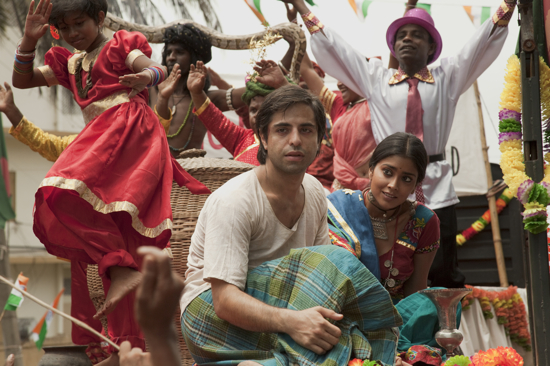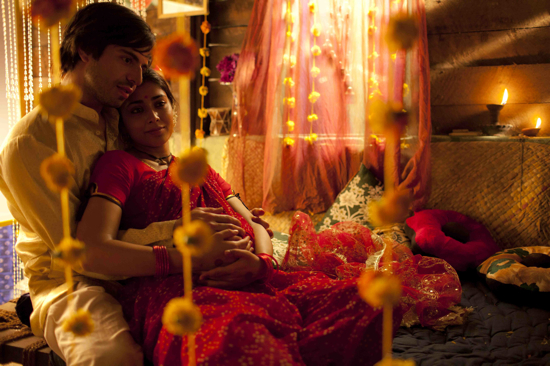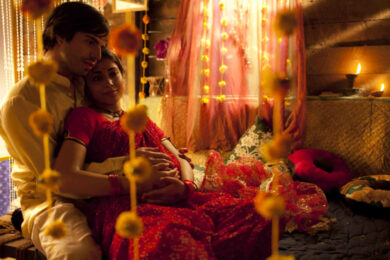"There are so many stories to tell, too many, such an excess of intertwined lives events miracles places rumours, so dense a commingling of the improbable and the mundane!"
So writes Salman Rushdie in the opening chapter of the novel on which Indian-born Canadian director Deepa Mehta’s Midnight’s Children is based and from which it takes its name. It is a summation of the book (winner not only of the 1981 Booker Prize but also of two best of the Booker awards in 1993 and 2008) as a whole and one of the most articulate expressions of both the magical realism and post-colonial genres of writing in microcosm you are likely to find. It is also advice that Rushdie himself – and his publishers (assuming their complicity) – should have taken before optioning the novel.
Given this – not only the narrative content, but the physical thickness of Midnight’s Children in its original form – it is, perhaps, unsurprising that Mehta’s interpretation of Rushdie’s novel is lacking and somewhat contrived. While 2012 seems to be the year of shooting what had previously, and not entirely incorrectly, been considered to be unfilmable novels – David Mitchell’s Cloud Atlas and Yann Martel’s Life of Pi, for example – Midnight’s Children is widely acknowledged to be a deliberately obtuse and unstable text. (Indeed, among many complications during and in pre-production, while she and Rushdie had agreed in 2008 to collaborate, Mehta’s first choice of novel was understandably not Midnight’s Children but the significantly less complex and considerably more recent Shalimar the Clown.)
As a result, there are too many voices in Mehta’s picture – not only those of the eponymous telepathic Midnight’s Children, India’s "promises of independence", their thoughts symbolically overwhelming – but those of the director, her husband and producer David Hamilton, and the author. In the case of the latter, the ‘voice’ is not purely metaphorical: as the movie’s narrator, Rushdie, using an affected Indian accent that raises a great many more questions than it answers, is party to the hapless schmaltz that pervades in Midnight’s Children.
This is indicative of the cheesy, ‘love conquers all’ sentiment that runs throughout. It’s more befitting of a Helen Fielding adaptation than what is widely acknowledged to be one of the greatest works of 20th century literature – spanning decades of war, peace, persecution and even genocide across three states – which suggests that the premise, however noble, has been thoroughly studiofied. Too many cooks spoil the chutney, and all that. Rushdie is simply too close to the project to relinquish full control.
(As an interesting aside, Gabriel García Márquez, has made it precisely clear that while there is breath in his body, there is no chance of his seminal One Hundred Years of Solitude being adapted for the screen. These failings say a great deal more about Rushdie’s oft-derided sense of self-importance and vanity that he would consent to this project, knowing full well it could never be entirely successful, than they do of Mehta’s talent as a director. To see one’s greatest work thrust again in to the public consciousness is a tantalising offer for someone such as Rushdie, who in spite of everything has a certain taste for the spotlight.)
Midnight’s Children is a film "handcuffed to history", spinning on the unsteady axis of 20th century India – its independence from British rule, resulting not-so-civil war and subsequent political tumult – with its protagonist, Saleem Sinai (Satya Bhabha) the only still point. If we are being generous, it is both to the credit and the unfortunate detriment of Deepa Mehta that she holds her audience in such high esteem under the assumption of prior knowledge. The timeline of extreme, politically seismic events that battered India during the period depicted is – at best – complex, and in lieu of the practical impossibility of getting those events across in 148 minutes, they are convoluted on screen.

Mehta’s generous presumption is just one of several red flags (and there are, after all, many changing flags in Midnight’s Children). The difficulties in production mentioned previously include several cast switches and a change of star. In simple terms, the studio couldn’t afford Indian actor Imran Khan for the central role that Bhabha plays in the finished product and, with respect (one has to be respectful of Skull and Bones alum), it is reflective of the movie as a whole: a noble kind of modesty, played out with the best intentions, which at times feels apologetically overplayed as compensation. Given that Rushdie has called Midnight’s Children his love letter to India, we might in our own act of generosity call this a nod to the incandescent Bollywood industry of present day Mumbai.
Midnight’s Children, in one of the few senses in which it stays true to the novel, and senses being the operative word, is ultimately a festival. Cinematographically it is a sensory overload of sound, colour, smell and taste evocative of the spirit (if not a great many of the harsh realities) of the India that outsiders and compatriots alike desperately want to believe in. But, like any carnival on this scale, it is all a little much. The premise is overwhelmed by the reality. There are too many things half-explained, too many ideas with too little information. It is possible to enjoy this film entirely separately from the novel, but in doing so it is left sorely lacking; there are simply too many assumptions. Too many stories – too little time.
Midnight’s Children goes on nationwide theatrical release from Wednesday December 26.



